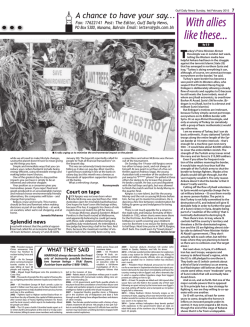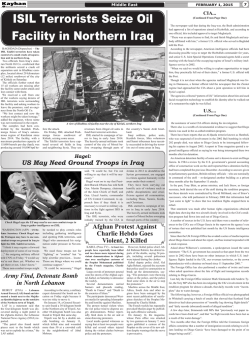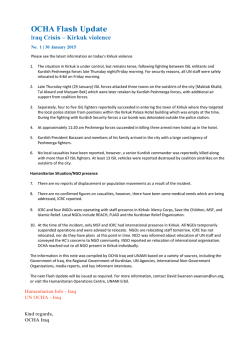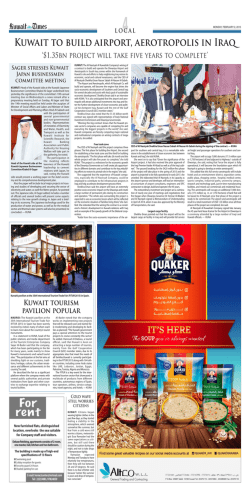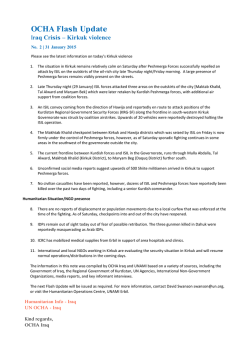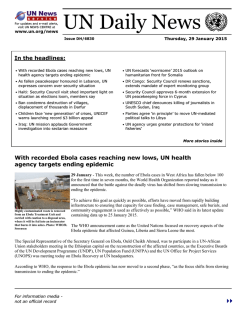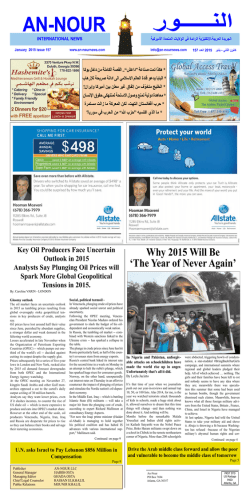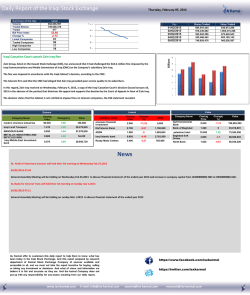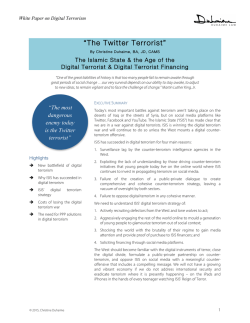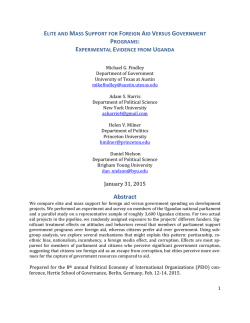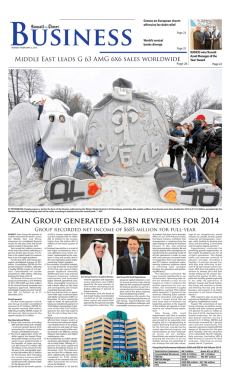
Rapists hiding tracks online, police warned
Section:GDN BE PaGe:1 Edition Date:150205 Edition:01 Zone:S Special supplement Kick off: your guide to the teams and the tactics Sent at 4/2/2015 21:10 My life in property Linda Grant looks back on a life in bricks and mortar cYanmaGentaYellowblack Meet your ur new bankk managerr Page 3 Long read £1.60 (Ch. Islands £2.00) Thursday 05.02.15 Published in London and Manchester theguardian.com Newspaper of the year Winner of the Pulitzer prize Step up the fight against Isis, say MPs Argument for more ‘robust’ approach including drones and special forces Ewen MacAskill Defence correspondent 12A * Britain needs to play a greater role in the fight in Iraq against Islamic State, according to a scathing report published today by the cross-party Commons defence committee, which describes the UK contribution so far as “strikingly modest”. Against a background of widespread public horror over Isis’s brutal murder of the Jordanian pilot Muadh al-Kasasbeh, MPs express dismay over Britain’s limited involvement and contrasts this position unfavourably with allies such as the US, Germany, Italy, Spain and Australia. Rory Stewart, the committee’s chairman, an independent-minded Conservative, said Britain was doing too little. “We must clearly acknowledge the previous failures in Iraq and reform our approach. But that does not mean lurching to doing nothing,” he said. In what is an unusually trenchant report by the defence committee, the MPs also accuse UK officials, ministers and officers of having “failed to set out a clear military strategy for Iraq or a clear definition of the UK’s role in the operations”. Given that Isis is regarded by the MPs as the most dramatic and significant threat to regional stability and international security to have emerged from the Middle East in decades, they say: “We are surprised and deeply concerned that the UK is not doing more.” The MPs highlighted the direct risk posed from Britons returning to the UK from Iraq and Syria. An estimated 600 British nationals have gone to Syria and Iraq; of these about 30 to 40 have been killed, half are still there and the remainder have returned. The MPs are not proposing that Britain deploys large numbers of combat troops to Iraq, as there appears little public appetite for that. But they are urging the government to adopt a much more robust approach with provision of special forces and drones as well as help with training, help at senior officer level, and money and equipment to bolster the Iraqi army. Opposition to military intervention overseas has grown in Britain since the controversial invasion of Iraq in 2003, culminating in a surprise Commons backbench revolt that led to a vote against involvement in the Syrian conflict in 2013. However, the public and political resolve to avoid Middle Eastern entanglements is being tested by graphic film footage of beheadings of journalists and aid workers by Isis, and of atrocities against Iraqis and Syrians. Senior British commanders remain reluctant to become involved in a military escalation without clear objectives, a significant problem during their time in Iraq and Afghanistan. The strong tone of the report may reflect the affinity felt for Iraq by Stewart, who helped administer the south of the country after the invasion. “The nightmare of a jihadist state establishing across Syria and Iraq has finally been realised. Daesh [an alternative name for Isis] controls territory equivalent to the size of the UK, has contributed to the displacement of millions, destabilising and threatening neighbouring states and providing safe haven to an estimated 20,000 foreign fighters, many dedicated to an international terrorist campaign,” Stewart said, adding that, in spite of all that, the UK role was modest. He added: “The committee was shocked by the inability or unwillingness of any of the service chiefs to provide a clear and articulate statement of the UK’s objectives or strategic plan in Iraq. There was a lack of clarity over who owns a policy – and indeed whether such a policy exists.” The UK has so far conducted only 6% of the air strikes against Isis. The committee, which visited Iraq in December, found at that time there were only three UK military personnel outside the Kurdish regions of Iraq compared with 400 Australians, 280 Italians and 300 Spanish. Britain has provided 40 heavy machineguns to the Kurdish regional government whereas Germany has provided a long list of armaments. Jordanians show their support for their government while waiting for the king to arrive from the US Photo: Raad Adayleh/AP ‘We will do what it takes to finish them’ Martin Chulov Amman Before the savage death of their pilot, many Jordanians worried their role in fighting Islamic State (Isis) could end up bringing the region’s woes back home. Now, the shocking images of Muadh al-Kasasbeh being burned alive have galvanised a country, leaving even sceptics of Jordan’s contribution to the international coalition demanding revenge and vowing “whatever it takes” to fight the terror group. The day after the horrific images of the caged pilot being burned alive were released, the streets of the capital Amman were subdued, except for the crowds that lined the road from the airport to the royal palace to welcome home their monarch King Abdullah from his shortened visit to Washington. Privately though, inside tea houses, universities, shopping malls and restaurants, people seethed. Radio and television stations played patriotic hymns on high rotation and all 23 minutes of the gruesome images were being widely circulated on social media. Occasionally, passions flared. “I swear to God we will kill all those pigs,” said Musab Ibrahim, from inside a cafe in Amman’s Old City. “Whatever it takes to finish them is what we will do.” On a nearby table four men interrupted a card game to condemn the executioners and eulogise Kasasbeh. “He is our son, he is a hero. All of Jordan is with him and with our king,” said Yousef Barghouti, a primary school principal. “We are all Hashemites and we are following the government with no reservations in this fight against these godless terrorists,” said another man, Yousf Majid al-Zarbi. “Have you seen that video? I mean really, how in humanity could this be a just punishment for any person?” At intersections in the heart of Amman, street vendors sold flags and funeral bouquets prepared for Kasasbeh. There were few takers though. A society that had been gripped for almost a month by the plight of Kasasbeh, and the pleas for mercy from his desperate parents, had seen the raw horror of his death eclipse their worst fears. Ghader Shathra, a nurse, said she had been numbed by the news, and the reality it would likely lead the country to war. “We have watched as the region has disintegrated. We have taken in almost 2 million refugees, and we have hoped it wouldn’t come our way. But sometimes you have to stand and fight. 17 We have no option.” Continued on page 2
© Copyright 2026
